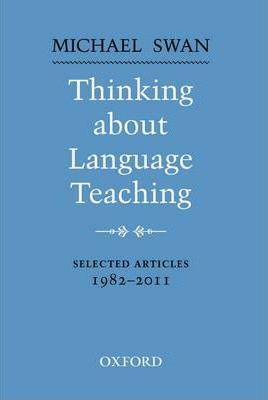Thinking about Language Teaching: Selected Articles 1982-2011

As the title suggests, this is not a resource book like others but an eclectic selection of Swan’s articles over the span of his career. Topics vary from Grammar (2011) to Language Teaching is Teaching Language (1996). Swan even includes H.G. Widdowson’s article, Against Dogma: A Reply to Michael Swan (1985), to give us a more balanced view on the communicative approach. The second section includes a delightful selection of satirical articles including The Use of Sensory Deprivation in Foreign Language Teaching (1982).
I rarely read these kinds of books, tending to stick to those that discuss approaches and methods. However, I found refreshing views on a variety of subjects along similar lines to Scott Thornbury’s Big Questions in ELT (2013). The articles are easy to read and entertaining and there were moments of COL (chuckle out loud). For example, in discussing the need for learning strategies, Swan comments that they are unnecessary for making an intelligent guess on when to use a Swedish phrase for ‘something is wrong with my gearbox’ (p. 11). However, Swan also makes serious points about diverse issues, such as how “often in language teaching, the activity takes over from the aim, and we end up doing things instead of teaching them” (p. 42).
This is a book for everyone: not only does Swan cover the range of subjects that a new teacher should be informed about, but his “polemic” (his own words, p. ix, Introduction) view on certain subjects, especially the Communicative Approach, which he believes “over-generalizes valid but limited insights until they become virtually meaningless” (p. 2), will make even the most experienced teacher reconsider their opinions. However, on the risk of quoting out of context, I urge you to read the whole article. I even found some articles useful for a review to be conducted for the M.A. TESOL I am taking up.
This is not a book to read in one sitting, but rather one where the reader would be advised to choose an article from time to time on a subject of interest, of which there are many: chunks, use of L1, textbooks, and grammar. Many topics that caught Swan’s attention 20 years ago are still subjects of debate today.
Swan’s down-to-earth style provides a refreshing change from certain highbrow articles in EFL journals, and makes us think: “That’s so obvious, why didn’t I think of that?’’ In fact, the subtitle of the article Chunks in the Classroom: Let’s Not Go Overboard could very well be the subtitle of the whole collection.
Rachael Harris
